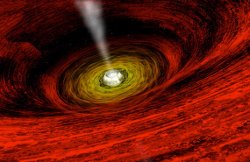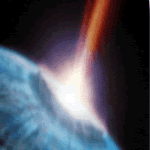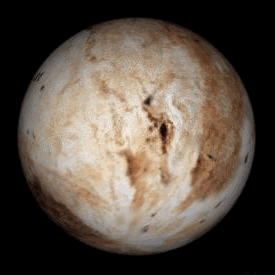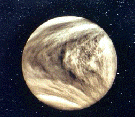|
|
|
|
A
WebQuest for
9th
Grade Earth Science
Designed
by:
Anthony
Greer
and
Richard
Catalano

Introduction | Task | Process | Web Resources | Evaluation | Conclusion | Credits | Teacher Page
|
|
|
|
A
WebQuest for
9th
Grade Earth Science
Designed
by:
Anthony
Greer
and
Richard
Catalano

Introduction | Task | Process | Web Resources | Evaluation | Conclusion | Credits | Teacher Page
It is the year 2055, the O-zone can not hold out forever so we want to start and try to explore other possibilities. To your delight you have finally achieved your dream! You have been nominated by NASA and the President of the United States to head up Team Genesis. Your team's mission over the next 10 years (if you choose to accept it), is to navigate throughout our solar system, determining if we can create sustainable life on all planets whether it be under the surface or in a space station built on the surface of the planet.

As you should be aware, in May of 1971 we attempted to look at Mars and it was found to be unsuccessful. It is up to you and your team to research and explore the planets of the solar system in order to find a planet that can sustain life.
Before you are able to
leave on this mission, you and your teammates have two weeks
to collaborate and submit your findings. Your team must
research each planet in our solar system and find the
following facts about each planet: (a table would be
recommended)
Your final report should include the following:
In order to complete this assignment you must follow these guidelines:
NASA Hubble
Space Telescope Life on other
Planets Saturn Uranus Venus
Neptune

Pluto

Grades will be given to the group as a whole instead of on an individual basis, so it is important that each member of the group donates adequate time and effort. Remember, your teammates will have the opportunity to judge each and every one of you.
Beginning Developing Accomplished Exemplary Score Team's
Hypothesis for Sustainable Life on Different
Planets Hypothesis
was not very well planned. No facts to support argument.
Length was too not adequate. Some thought
was put into the hypothesis but is still too short. Too much
speculation with little facts. Hypothesis
was well thought out. Arguments were supported with some
facts and some speculation. Hypothesis
was well thought out. Arguments were supported with facts,
not speculation. Defended both sides of argument. Was of
adequate length. Ability
to Retrieve Facts on the Different Planets. No facts, all speculation.
No proof of where information was retrieved. Facts were found for some
planets. Most of the information
retrieved was true, with resources cited. All facts are true, with
resources cited. Essay Half of the required length
or shorter. Too much speculation, few facts to back up your
arguments. Essay was choppy, did not
flow well. Sections were too short. Some facts, but still
too much speculation. Was of required length. Flow
of essay was good. Few speculations, mostly facts. Shared
some interesting facts. Paper was well thought out.
Flowed well in between planets. Sections were of assigned
length or longer. Interesting facts were presented to the
team. Use
of Resources (i.e. Works Cited Page, Different Types of
Media Used) Had only one source. Did not
follow citation guidelines. Used two sources. Only one
kind of media. Works cited page is not adequate. Used three to four sources.
Cited all sources, used different types of media.
Used five or more sources,
cited all sources used. Received adequate information from
each source used. Used three different types of
media. Shoebox
Diagram Did not present one or very
little time and effort put into it. Little explanations. Not
very creative. Attention to detail was slim. Well constructed, with
explanations. Good attention to detail. Attention to detail was
intact. Creative, and well explained. Peer
Evaluation Team member did not stay on
task. Did not get their share of the work done. Team member did not
contribute much. Had assignments in on a timely
manner. Team member slacked at
times, but overall was a key contribution to the group.
Team member contributed
equally to all parts of the project. Was on task at all
times, and very well presented.
1
2
3
4
Congratulations, you are well on your way to leading Team Genesis and the rest of human kind into the promised land. You are a modern day Christopher Columbus. The United States and NASA will be investing a lot of time and money into the decisions you have made to try to populate the planets you have investigated. While doing this project, you learned about the what makes up our Solar System and how each planet differs from the other. You should now feel confident about your knowledge regarding our Solar System and that if any person off the street were to come up to you and ask you a question about the Solar System, you would undoubtably be able to answer them with a wealth of knowledgable facts.
The
Nine Planets
- This website is actually linked to Blackboard within the Academic
Web Resources page and proved to be a valuable link in order to find
many interesting facts regarding our solar system.
Google
Image Search
- Within this site we were able to obtain mostly all the pictures and
.Gif's we used in our Webquest.
NASA
-
This website allowed us to research any prior efforts that have been
made in the past to find life on other planets. (e.g.. the Mars
landing) Also, we were able to get an idea of what space travel
entails for an astronaut.
Life
On Other Planets
-
This website allows students to see first hand what type of factors
are involved in finding life on other planets than earth. It
discusses each planets environmental factors, which would cause
problems for human existence.
Hubble
Telescope
- This website gives a good insight on how the universe is looked at
today.
Last
updated on
October 31,
2002 .
Based
on a template from
The
WebQuest Page